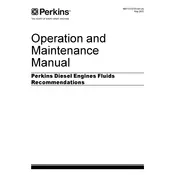Perkins Diesel s Fluids Maintenance Manual


Perkins recommends using high-quality diesel engine oils that meet API CH-4, CI-4 or CJ-4 specifications. It is important to refer to the engine's manual for specific viscosity grades suited to your operating environment.
The oil change interval for Perkins diesel engines typically ranges from 250 to 500 hours of operation, depending on the specific model and operating conditions. Always refer to the engine's manual for precise intervals.
Use a high-quality ethylene glycol-based coolant mixed with distilled water in a 50:50 ratio. Ensure it meets ASTM D6210 or equivalent specifications for heavy-duty diesel engines.
Check the fuel system for air leaks, ensure the battery is fully charged, and inspect the glow plugs or intake air heaters. Also, verify that the fuel filter is clean and the fuel pump is functioning properly.
Excessive smoke can be caused by a variety of issues including a dirty air filter, faulty injectors, or a clogged exhaust. Inspect and clean these components, and adjust the fuel injector timing if necessary.
Regularly replace fuel filters, keep the tank clean and free from water contamination, and use high-quality fuel. Additionally, periodically check for leaks and inspect the condition of fuel lines and connections.
Run the engine to operating temperature and change the oil, drain the cooling system or add antifreeze, disconnect the battery, and store the engine in a dry environment. Consider using fuel stabilizer in the fuel tank.
Regularly inspect and clean or replace the air filter. Check for any obstructions in the air intake ducts and ensure that all connections are tight to prevent air leaks.
Inspect the exhaust manifold and gaskets for leaks or cracks, check the condition of exhaust pipes and mufflers for corrosion or damage, and ensure that the exhaust system is securely mounted.
Regular maintenance is key. This includes routine oil changes, replacing filters, using quality fluids, monitoring engine performance, and addressing any issues promptly. Keeping the engine clean and properly tuned also contributes to longevity.